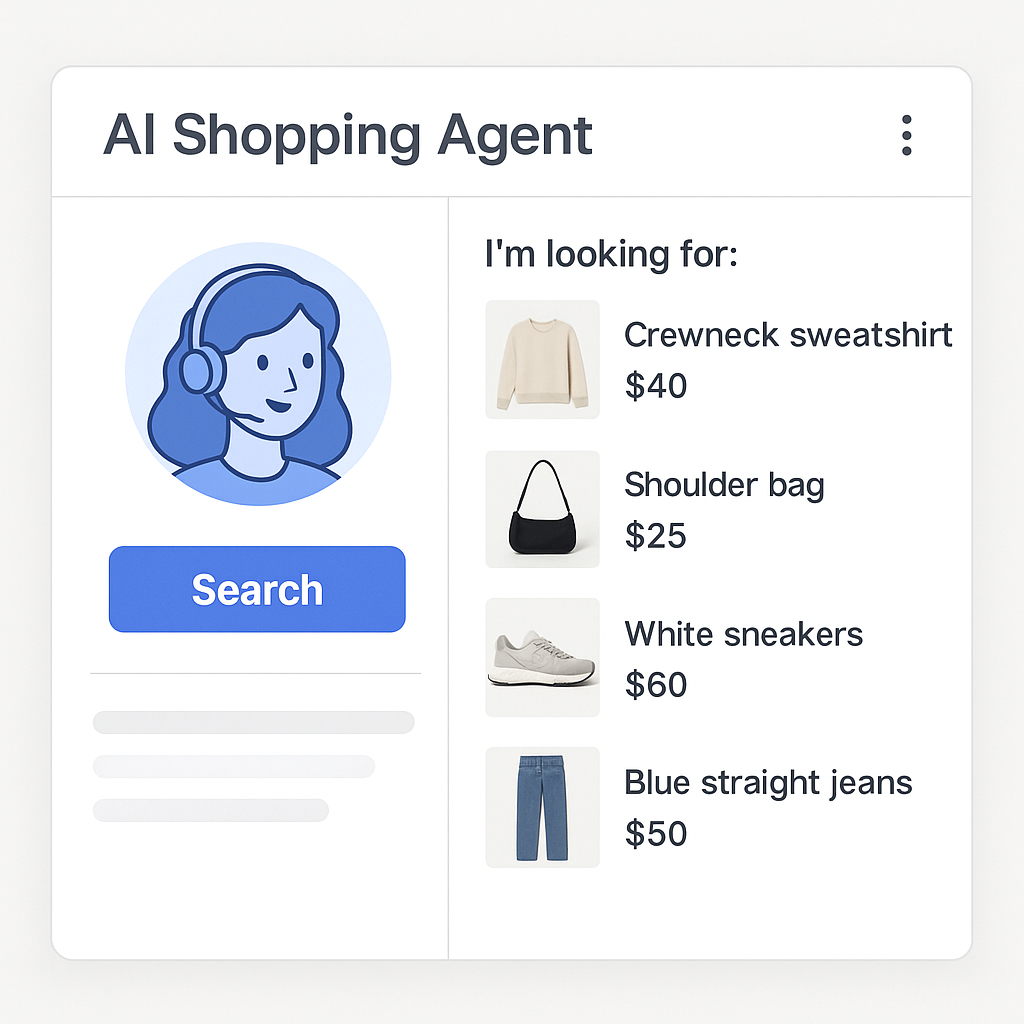
Back in March 2023, I wrote this article about how I was beginning to leverage AI (specifically ChatGPT) in helping me frame business partnerships. This was relatively early in the commercialization of AI. That now feels like an eternity as the space continues to evolve. Today’s post is not an overview of AI – for newbies I highly recommend LinkedIn Learning’s Generative AI for Business Leaders course taught by Tomer Cohen. Google also has a training module on Coursera for business leaders which is a good primer. It’s easy to go down a rabbit hole trying to wrap your head around the space so my recommendation is to start with the basics and then tailor the learning to your specific field.
I wanted to share today another use case that has been generating noise and is relevant to retailers and brand marketers – and top of mind for me given my background working in and consulting DTC brands, consumer goods companies, and retailers – the rise of AI shopping agents.
Online discovery of products/services and the associated marketing conversion funnel is going to drastically change. Apple’s Eddie Cue recently said search traffic on Safari has dropped for the first time in two decades. The reason – AI is fundamentally changing the way users search for information. Google, which has built a massive ads business via links, is facing a lot of change as consumers begin searches through AI agents, circumventing their search engine.
What does this have to do with e-commerce/retail? It’s quite possible the next customer to visit your e-commerce site is not a human at all, but rather an AI Shopping agent.
Walmart recently announced they were making large changes to their e-commerce channels in order to make the content more appealing to these AI agents. This means completely blowing up the idea of how items are merchandised online, including imagery, product details, and promotions, that are aimed at attracting humans. OpenAI’s Operator agent in the near future will be able to do your grocery shopping, buy a new washing machine, and even pay for things on your behalf. And the idea of keyword search will change dramatically. For example, instead of going to Walmart and searching for birthday balloons for my son’s birthday using a simple keyword, I can say I want a birthday party with an African animal safari theme and the AI agent will crawl the internet and curate a list of items for me to buy and even complete the purchase on my behalf.
Retailers can’t (and aren’t) just going to sit back. They are developing their own agents, but they live in a closed ecosystem and consumers don’t typically shop at one place. This means in the future customers’ personal AI agents will have to interact with a retailers agent (via an agent-to-agent) protocol. The other area this upends is price discovery. Agents will be able to crawl data sources in record time to find customers the lowest price on an item which means retailers’ systems may have to make quick decisions on whether to offer discounts or price match – or risk losing the sale.
One of the brands I was consulting briefly earlier this year realized that if so much of the discovery is going to happen further up the funnel and likely not on their e-comm/DTC website, then having heavy imagery on their PDP (product detail page) might be a moot point. This is a departure from the last 10 years where imagery was crucial to helping build the brand story. The AI agents mostly will be leveraging text in formulating their recommendations.
Where does this go?
- These AI agents will be multifaceted, not only used for shopping, but many aspects of your life
- AI agents that assist consumers in their purchasing journey will lead to a shift in the balance of power away from retailers and towards brands and AI-agents. HBR refers to this as the flattening of retail. Platforms like Amazon will likely be okay given the vast amounts of data they collect and the speed at which they are able to deliver products – all key criteria the AI shopping agents will use in making their recommendation. Similarly, premium retailers who offer a niche assortment of exclusive sku’s will also have an advantage. The challenge will be in the middle (e.g. department stores) where they will have a difficult time competing on price and lack the scale of an Amazon for customer service/returns, etc.
- Ratings and Reviews will fundamentally change – given the immense trove of customer reviews on social sites like Reddit, AI agents will value these results more than the reviews you see on a retailer or brand website/app. This means that new upstart brands may get surfaced more by the agents than established ones. For example, think of P&G who spends billions on marketing their brands every year. All those ads might be seen by consumers, but will their AI shopping agent still recommend Tide, or rather a new fast growing startup laundry brand trending on Reddit?
- New marketing talent – brands and retailers have relied heavily on SEO over the last 10-15 years in order to boost their presence on the search engines. That will change. Marketing teams will now need to embrace AAO (AI Agent Optimization) to ensure their platforms resonate with the plethora of AI agents hitting the market over the next few years. This complicates matters, because AI agent aggregators, like Poe, make it very easy for the user to switch between different agents in their search of products or services. Thus, the retailer will not know whether the customer will use ChatGPT, DeepSeek, Perplexity, or any combination of agents for its queries.
- Media/ad campaigns will have to feature more text to be picked up by the AI agents vs relying on emotional imagery to sell products.
